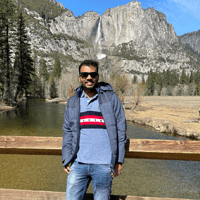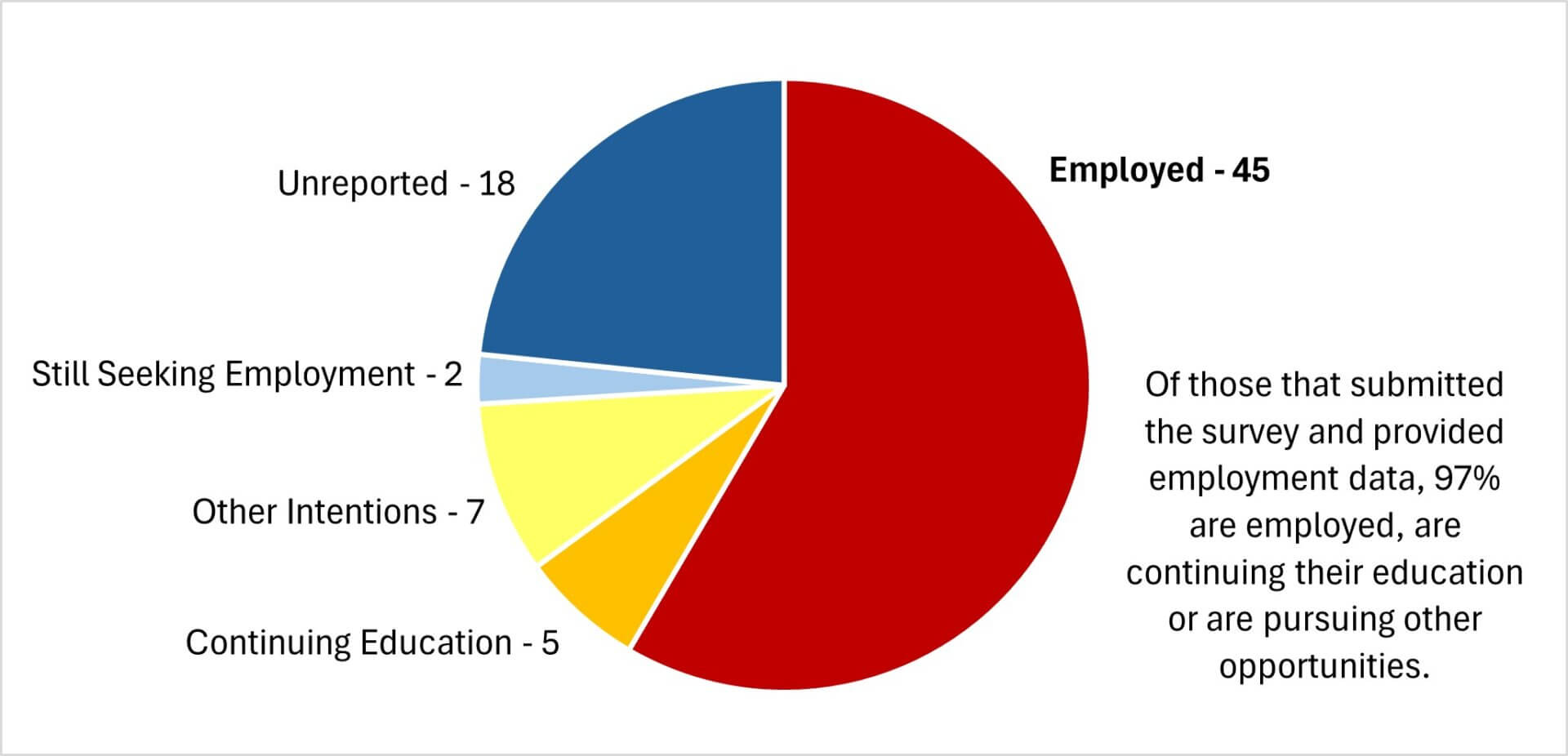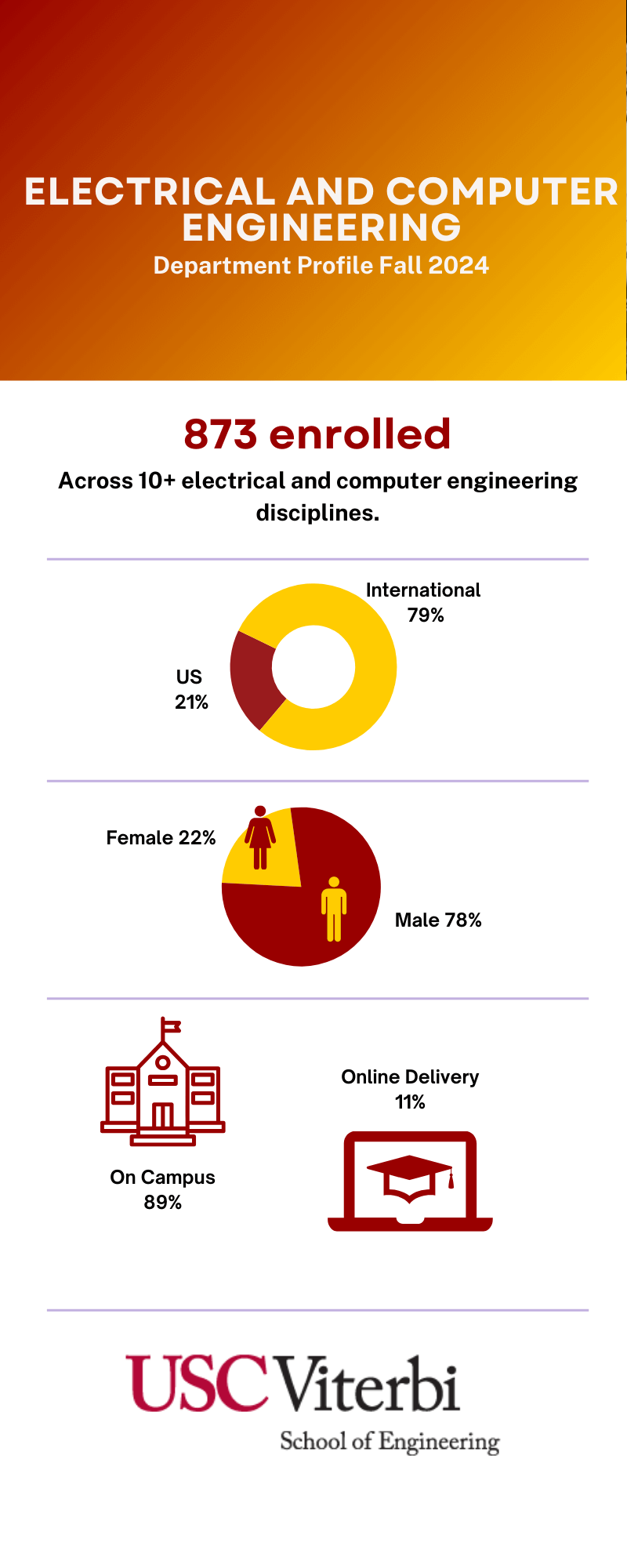Master of Science in Computer Engineering
Application Deadlines
SPRING:
Extended to: October 1
FALL:
Scholarship Consideration Deadline: December 15
Final Deadline: January 15
- Program Overview
- Application Criteria
- Tuition & Fees
- Meet our Students
- Career Outcomes
- DEN@Viterbi - Online Delivery
- Request Information
Computer Engineering is the creative application of engineering principles and methods to the design and development of hardware and software systems. The MS in Computer Engineering encompasses the design, development, testing, and evaluation of components, systems, and networks.
Research in Computer Engineering strives to achieve higher performance in the systems and components that are built as well as in the design process. At USC, research is focused in three main areas: Computer Architecture and Parallel Processing, Design and Analysis of Computer Networks and their Protocols, and VLSI Design and Computer Aided Design and Verification of VLSI. This degree program is administered by the Department of Electrical and Computer Engineering.
International Students: This program is eligible for the OPT STEM extension.
- This program requires completion of 28 units of coursework
- Thesis option and Directed Research (research without thesis) may be requested after completing first semester. Thesis option is not guaranteed
- USC Catalogue
- USC Schedule of Classes
| SEMESTER | DEADLINE |
|---|---|
| Spring | September 1 (extended to October 1) |
| Fall | December 15 (Scholarship consideration) January 15 (Final deadline) |
Visit our Ready to Apply page for more information
ELIGIBILITY CRITERIA
Applicants to the Master of Science program in Computer Engineering must have a bachelor’s degree or be in the process of completing a bachelor's degree. Most applicants have degrees in engineering or closely related fields, such as Electronics, Computer Science, Math, and Physics.
Applicants without a bachelor's degree in a directly related field may still be considered if they have completed and demonstrated strong proficiency in the following coursework (or equivalent):
| Electrical Engineering |
| Linear Circuits |
| Linear Systems |
| Math |
| Physics |
This is not an exhaustive list. Applications are reviewed holistically; simply taking these courses does not guarantee admission.
APPLICATION REQUIREMENTS
The following materials are required to be included with your online application:
- Transcripts
- Resume/CV
- Personal Statement
- Letter of Recommendation (Optional)
NOTE: The GRE is not required for 2026 applications.
The following link will take you to an overview of the tuition & fees for graduate engineering students, including payment information. Both on-campus and DEN@Viterbi students pay the same tuition
Use the link below to download the Cost of Attendance to see a summary of tuition and fees by semester. The document is a typical example and the number of courses, and time to complete the program, will vary by student.
 PIYUSH KASERA
PIYUSH KASERA
What were the main reasons you chose to pursue this graduate program at USC?
USC is highly regarded as one of the most diverse universities and I felt I could experience different cultures, meet with various kinds of people from across the world and make strong connections. My current graduate program at USC has excellent coursework which helps you get into the industry. The professors are really good and there is a strong link between the course structure and what the people in the industry want to see in us.
I love computer engineering and architecture and especially working on designing chips and the coursework has helped me gain a lot of insights into what I would experience once I enter the industry
What are some personal achievements or experiences you’d like to share?
One of my achievements has been to finally enter the graduate program at USC.
Also, before I joined USC, I used to work for Intel for 3 years. There I was recognized twice and was awarded with a Division Recognition Award for excellent work and for helping customers. Customer obsession was one of the main motives behind every work and I felt so happy to have worked for such a great company and to meet with different customers and help them at every point in time.
Which organizations/activities have you been involved with outside of the classroom?
Well, my coursework demands lots of hours and hence I did not get involved much outside the classroom. But, one thing I surely got involved in was the Viterbi Mentorship Program. This helped me guide and mentor the incoming students and help them settle smoothly into the graduate program.
2024 First Destinations Survey - Outcomes*

Top Employers*
Antra, Inc.; Apple; NVIDIA; Qualcomm; State Grid Corporation of China
.Alumni Employment - 2024*
Companies & Job Titles (multiple positions may be listed)
- The Aerospace Corporation - MTS
- Amazon - Software Development Engineer
- Antra, Inc. - Java Developer
- Apple - DFT Engineer / Physical Design Engineer
- Astera Labs - Emulation Engineer
- Collins Aerospace - Software Engineer II
- Cuebric - Machine Learning Engineer
- Cycle Link (USA), Inc. - IT Support Intern
- Easley-Dunn Productions, Inc. - Game Developer
- ElectrifAI - Data Scientist
- Google - ASIC Design Verification Engineer
- Hewlett Packard Enterprise - Network Engineer
- Honeywell - Software Engineer II
- Intel - PDK Support Engineer
- Involve.AI, Inc. - Solutions Architect
- Juniper Networks, Inc. - Software Engineer 2
- NewCortex LLC - ML Engineer
- NVIDIA - DFT Engineer / Senior ASIC Engineer / System Design Engineer / Systems Software Engineer
- NXP Semiconductors - Software Engineer
- Qualcomm - ASIC Design Engineer / Engineer
- Rivos Inc. - Accelerator & Processor Logic Design Engineer
- Salesforce - Software Engineer
- SambaNova Systems - Hardware Engineer
- Scale AI - AI-Training Coder
- Shahin Nazarian / Technical Research Staff
- State Grid Corporation of China – Engineer / Research Engineer
- Tesla - Vehicle Software Developer
- Thales - Software Developer
- Trepko, Inc. - Systems Engineer
- University of Southern California - Graduate Research Assistant / Research Assistant
- VOC.AI - Software Engineer
- ZEFR, Inc. - Machine Learning Engineer
Previous Years
- Advanced Micro Devices, Inc. - Performance Architect, Silicon Design Engineer 2
- Amazon - Software Development Engineer
- Apple - CPU Implementation Engineer, GPU RTL Engineer, Hardware Engineer, SoC Physical Design Engineer, SoC Physical Design Engineer (STA/Timing)
- Broadcom - R&D IC Design Engineer
- Cisco Systems - ASIC Engineer
- Freelance - Game Developer
- Google - Design Verification Engineer, RTL Design Engineer, Software Engineer, Software Engineer (SRE)
- Heartdub - Software Engineer
- Intel - Graphics Hardware Engineer
- MediaTek - Memory Design Engineer
- Microsoft - Software Engineer II
- NVIDIA - ASIC Design Efficiency Engineer, ASIC Design Engineer, ASIC Verification Engineer
- Oracle - Software Engineer
- Qualcomm - AI Software Engineer, CPU Physical design engineer
- Solidigm Technology - Failure Analysis R&D Engineer
- Synopsys, Inc. - R&D Engineer II
- TenaFe, Inc. - System SoC Engineer
- Tesla - Firmware Engineer
- TikTok - Software Engineer
.Internships (Summer 2023)**
Advanced Micro Devices, Inc.; Amazon; Apple Inc.; Aurora Innovation, Inc.; Bank of China, New York Branch; Big Vision LLC; Cadence Design Systems; Cirrus Logic; Cisco Systems, Inc.; Collins Aerospace; Fevr LLC; Hewlett Packard Enterprise; Infoblox; Intel Corporation; Juniper Networks, Inc.; NVIDIA Corporation; NXP; Qualcomm; Skyworks Solutions, Inc.; Sony; Tesla, Inc.
.
* Information is based on a voluntary survey and should not be interpreted as a comprehensive view of the 2024 graduating class.
** Internship data is from CPT internships done by our international student population.
This program is also available online to professional engineers through DEN@Viterbi. Because the DEN@Viterbi program provides a fully equivalent academic experience, the degree a USC engineering student earns is the same whether they are on-campus or online. If you are interested in beginning classes as a DEN@Viterbi student next semester, explore the requirements and steps to enrolling as a Limited Status Student. Learn More About DEN@Viterbi
Detailed Program Curriculum and RequirementsSchedule of Classes
DEN@VITERBI ONLINE COURSE OFFERINGS The following courses and program requirements serve as program planning for DEN@Viterbi students. Course offerings and availability are subject to change. Please consult with advisor if you have any questions.
| The Master of Science in Computer Engineering is earned by completing an integrated program of at least 28 units of approved course work emphasizing three key areas - Architecture, VLSI and Networks. Students must take one course from at least two areas, outlined below. |
| Computer Engineering course work requirements |
| Take a minimum of 20 units of Computer Engineering courses from the three lists below, including at least one course from two of the three areas in Architecture, Networks and VLSI/CAD areas. Electives from the Foundations area will also count toward the 20 unit Computer Engineering requirement. |
| Computer Architecture Area |
| EE 457 | Computer Systems Organization (4 units) |
| EE 557 | Computer Systems Architecture (4 units) |
| Networks Area |
| EE 450 | Introduction to Computer Networks (4 units) |
| EE 555 | Broadband Network Architectures (3 units) |
| VLSI/CAD Area |
| EE 477L | MOS VLSI Circuit Design (4 units) |
| EE 536a | Mixed-Signal Integrated Circuit Design (4 units) |
| EE 552 | Asynchronous VLSI Design (3 units) |
| EE 577a | VLSI System Design (3 units) |
| Foundations |
| Additional approved Computer Engineering electives that will count toward the 20 units required in the computer engineering area. |
| CSCI 402 | Operating Systems (4 units) |
| EE 503 | Probability for Electrical and Computer Engineers (4 units) |
| EE 510 | Linear Algebra for Engineering (4 units) |
| EE 660 | Machine Learning from Signals: Foundations and Methods (3 units) |


